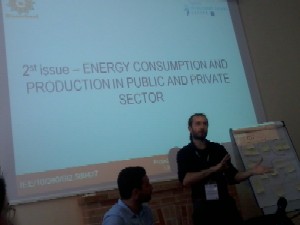Tutoring cities
‘Peer-to-peer’ learning involves groups of different cities working on similar issues evaluating each others’ local energy policies, programmes and practices and giving recommendations on possible areas of improvement.
Those making the evaluation are called peers because they come from backgrounds similar to colleagues whose work is reviewed.
A key strength of the process is that – as peers – they can readily understand the goals of the practitioners whom they visit, the pressures on them, and the complexity of their environment. Partners will produce a joint report and guidelines on peer-to-peer working as an output of this joint initiative.
The project CONURBANT proposes a system of peer-to-peer activities with a multiple level focus:
- peer-to-peer activities between stratup cities and experienced cities within the Consortium: Alba Iulia and Padua that have already developed their SEAP and are in the phase of implementation and monitoring guide the other cities of the Consortium through many activities: such activities - which are carried out mainly direct training , presentation of best practices and guided tours - have the main goal of generating in the project consortium a shared level of expertise
- peer-to-peer between couples of cities. This activity is still run by the experienced cities (in this case called "tutoring cities"!) that guide couples of cities in a audited process aiming to make cross-gain knowledge on the various areas of energy use and energy planning at both a technical and political level.
Here are the twinning cities of the CONURBANT Consortium: Vicenza is twinned with Palma (tutoring city Padova), Osijek is twinned with Cyprus (tutoring city Padova), Arad is twinned with Timisoara (tutoring city Alba Iulia), Salaspils is twinned with Vratsa (tutoring city Alba Iulia)
the last type of peer-to-peer activity that the CONURBANT Consortium carries out is the one between the biggest cities of the Conurbations – that are the 10 cities of the consortium - - and the other neighboring towns that all together make up the Conurbation ant that joined the idea of making a "joint Conurbation SEAP". The big cities, that during the project implementation have acquired multi level peer-to-peer knowledges, can use such new competencies to bundle their metropolitan cities that often are small and lacking of internal human resources to be able to develop by themselves the SEAP.

